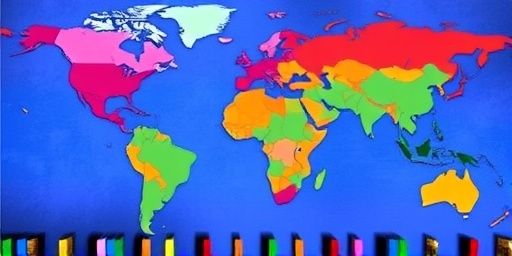In a dramatic showdown at the ongoing UN climate talks in Baku, Azerbaijan, representatives from vulnerable island nations and major environmental organizations unleashed sharp criticism against the latest draft proposals, branding them as woefully inadequate in the face of accelerating climate change. With global temperatures shattering records and extreme weather events ravaging communities worldwide, delegates argued that the current policies fall short of what’s needed to curb global warming and protect the environment.
- Vulnerable Island Nations Rally Against Insufficient Emission Targets
- Environmental Organizations Escalate Demands for Climate Finance Overhaul
- Major Economies Face Backlash Over Fossil Fuel Commitments
- Scientific Warnings Intensify Pressure on UN Climate Negotiators
- Path Forward: Bridging Divides for Effective Global Climate Action
The summit, formally known as COP29, has become a battleground for urgent calls to action. Small island developing states, already on the frontlines of rising sea levels, led the charge, warning that without stronger commitments, entire nations could vanish beneath the waves. ‘These proposals are a death sentence for our people,’ declared the delegate from Tuvalu, encapsulating the frustration echoing through the halls.
Vulnerable Island Nations Rally Against Insufficient Emission Targets
At the heart of the discontent are the proposed emission reduction targets, which critics say do not align with the scientific imperatives of limiting global warming to 1.5 degrees Celsius above pre-industrial levels. The Alliance of Small Island States (AOSIS), representing 39 nations, issued a joint statement slamming the drafts for lacking enforceable timelines and financial support mechanisms. ‘We are not asking for charity; we are demanding justice,’ said AOSIS spokesperson, Amena Yauvole, during a heated plenary session.
Statistics underscore the peril: According to the Intergovernmental Panel on Climate Change (IPCC), sea levels have risen by about 20 centimeters since 1900, with projections indicating up to one meter by 2100 if emissions continue unchecked. For low-lying atolls like those in the Pacific, this translates to the loss of habitable land and freshwater sources. Kiribati’s president, Taneti Maamau, highlighted this in his address, noting that his country’s 133,000 residents face displacement without robust global warming mitigation policies.
The UN climate talks have seen similar tensions in past years, but this iteration feels particularly charged amid 2023’s record-breaking heatwaves and floods. Environmental policy experts point out that the current proposals rely heavily on voluntary national contributions, which have historically fallen short. A report from the UN Environment Programme (UNEP) released just before the summit warned that the world is on track for 2.5 to 2.9 degrees Celsius of warming by century’s end, far exceeding safe thresholds.
Delegates from Bangladesh and Vietnam, both grappling with devastating monsoons exacerbated by climate change, echoed these sentiments. Bangladesh, home to 170 million people in a delta prone to flooding, reported over 100 deaths from recent cyclones linked to warmer ocean temperatures. ‘Our environment is collapsing, and these weak policies offer no lifeline,’ stated Bangladesh’s climate minister, Saber Hossain Chowdhury.
Environmental Organizations Escalate Demands for Climate Finance Overhaul
Joining the fray, powerhouse environmental groups like Greenpeace, WWF, and Friends of the Earth have mobilized protests outside the convention center and lobbied fiercely inside. Greenpeace Executive Director, Jennifer Morgan, called the proposals ‘a greenwashing exercise’ that prioritizes corporate interests over planetary survival. ‘The time for half-measures is over; we need binding commitments to phase out fossil fuels entirely,’ she urged in a press briefing.
A key bone of contention is climate finance. Developing nations, which contribute the least to global warming but suffer the most, are demanding that wealthy countries fulfill their pledge of $100 billion annually in adaptation and mitigation funds—a promise first made in 2009 but consistently underdelivered. The current drafts propose scaling this to $300 billion by 2030, but without clear sources or accountability, it’s met with skepticism.
WWF’s analysis, shared during side events at the UN climate talks, reveals that only 25% of the promised funds have materialized in recent years, mostly as loans rather than grants. This shortfall hits hardest in Africa, where droughts fueled by climate change have led to famines affecting millions. Ethiopian representative, Melesse Alemu, testified that crop yields have dropped 20% in the last decade due to erratic rainfall patterns, blaming insufficient policy support from the Global North.
Protests have added to the summit’s intensity, with activists staging die-ins to symbolize lives lost to environmental neglect. One banner read: ‘No Planet B – Strengthen the Policy Now.’ These actions have amplified the voice of indigenous communities, who argue that current proposals ignore traditional knowledge essential for sustainable environment management.
Major Economies Face Backlash Over Fossil Fuel Commitments
While small nations and NGOs lead the criticism, even some larger economies are voicing concerns. The European Union, a traditional climate leader, expressed disappointment that the proposals do not include a clear timeline for phasing out coal and other fossil fuels. EU Climate Commissioner, Wopke Hoekstra, stated, ‘We came here for ambition, not excuses. Global warming demands we act decisively.’
China and India, the world’s top emitters, defended their positions, citing developmental needs, but faced pushback from allies like Brazil and South Africa. Brazil’s environment minister, Marina Silva, highlighted the Amazon’s role as a carbon sink, warning that deforestation rates—up 30% this year—could be curbed only with stronger international policy incentives.
Scientific backing bolsters the outcry. NASA’s data shows 2023 as the hottest year on record, with global average temperatures 1.18 degrees Celsius above pre-industrial levels. The World Meteorological Organization (WMO) predicts that without aggressive cuts, tipping points like the collapse of the Greenland ice sheet could be reached by 2050, leading to irreversible sea-level rise.
In negotiations, a coalition of 100 countries pushed for a ‘fossil fuel non-proliferation treaty,’ modeled after nuclear disarmament efforts. This proposal, though ambitious, gained traction among youth activists who flooded social media with #StrongerAtCOP29, trending worldwide and pressuring policymakers.
Scientific Warnings Intensify Pressure on UN Climate Negotiators
Underpinning the summit’s urgency are fresh reports from leading scientists. The IPCC’s latest assessment, cited repeatedly in speeches, emphasizes that current trajectories could result in 3.2 billion people facing chronic water scarcity by 2050 due to climate change impacts on the environment. Dr. Helen Mountford, Vice Chair of the IPCC, addressed delegates: ‘The evidence is unequivocal—weak policies today mean catastrophe tomorrow.’
At side panels during the UN climate talks, experts dissected the proposals’ flaws. One study from the Stockholm Environment Institute found that the draft’s reliance on carbon markets could allow emissions to continue rising under the guise of offsets, which often fail to deliver real reductions. ‘Offsets are no substitute for direct cuts,’ argued lead researcher, Maria Nordlander.
Biodiversity loss ties into these concerns, with the UN’s biodiversity conference linking climate policy to species extinction rates, now 1,000 times higher than natural baselines. Coral reefs, vital for 1 billion people’s livelihoods, have seen 14% global die-off since 2009, accelerated by ocean warming.
Youth delegates, including Greta Thunberg, who attended virtually, lambasted the inaction: ‘World leaders are treating this crisis like a PR event, not a survival imperative.’ Her words resonated, galvanizing student walkouts in cities from New York to Nairobi.
Path Forward: Bridging Divides for Effective Global Climate Action
As the UN climate talks enter their final days, the path ahead hinges on compromise. Mediators are proposing a ‘loss and damage’ fund expansion and technology transfer agreements to sweeten the deal for developing countries. UN Secretary-General António Guterres called for ‘a pact that saves our planet,’ urging nations to transcend politics.
Looking ahead, the outcomes could shape the 2030 agenda. If strengthened, these policies might accelerate the transition to renewables, projected to create 25 million jobs by 2030 per the International Renewable Energy Agency (IRENA). Failure, however, risks escalating conflicts over resources strained by global warming.
Stakeholders remain cautiously optimistic. AOSIS vows to block adoption of weak texts, while the US, under new climate envoy John Kerry, signals willingness to boost finance contributions. Environmental groups plan post-summit campaigns to hold governments accountable, ensuring that the environment’s plight drives real policy change.
In the broader context of climate change, this summit underscores the interconnectedness of global efforts. From polar ice melt affecting ocean currents to wildfires devouring forests, the crisis demands unified action. As delegates haggle, the world watches, hoping for proposals that match the scale of the threat.








